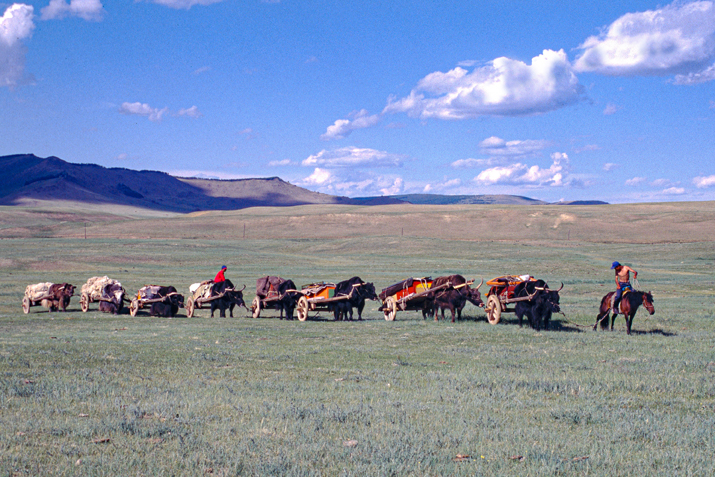
Tracks in the snow
N 51°05'082'' E 100°00'042''
Day: 98
Sunrise:
08:08
Sunset:
17:59
Total kilometers:
1026
Soil condition:
Ice, snow, rock, meadow
Temperature – Day (maximum):
minus 5°C
Temperature – day (minimum):
minus 8°C
Temperature – Night:
minus 30°C
Latitude:
51°05’082”
Longitude:
100°00’042”
Maximum height:
2000 m above sea level
Time of departure:
12:00
Arrival time:
18:20
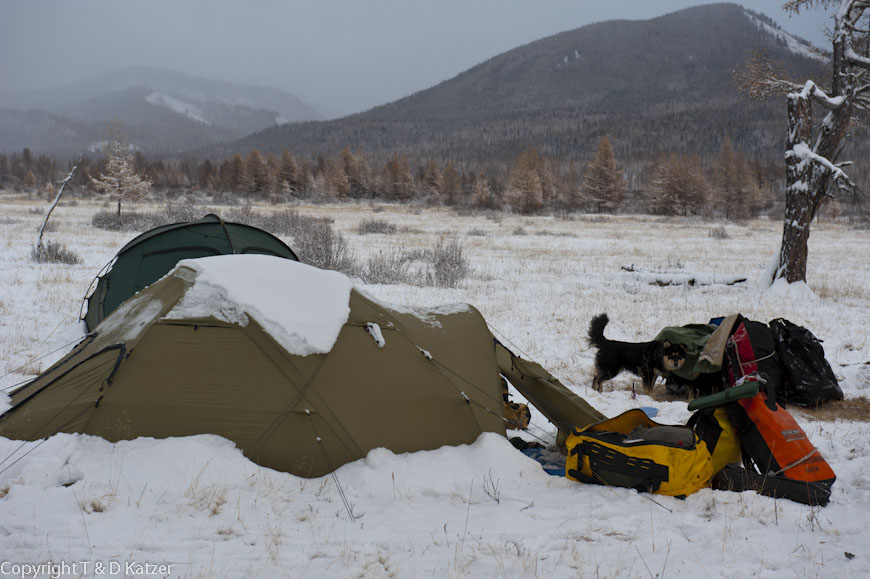
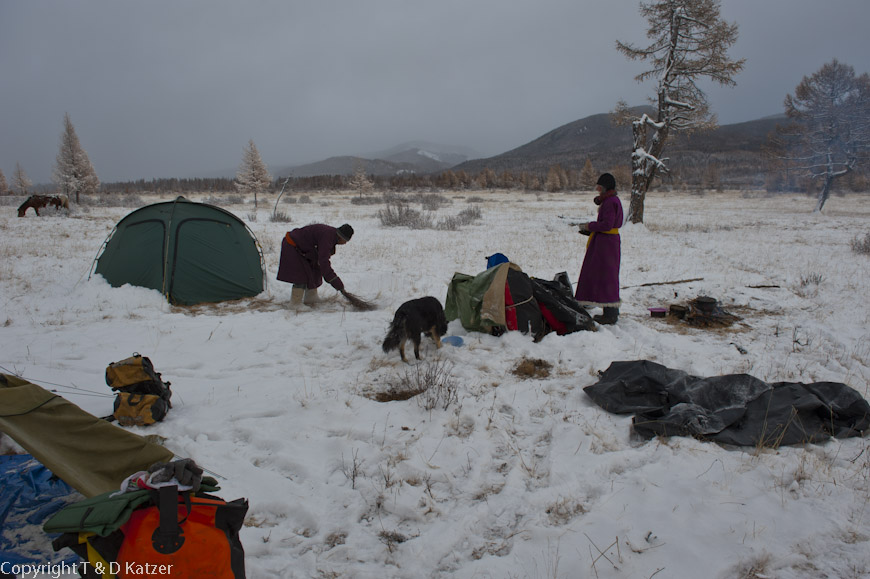

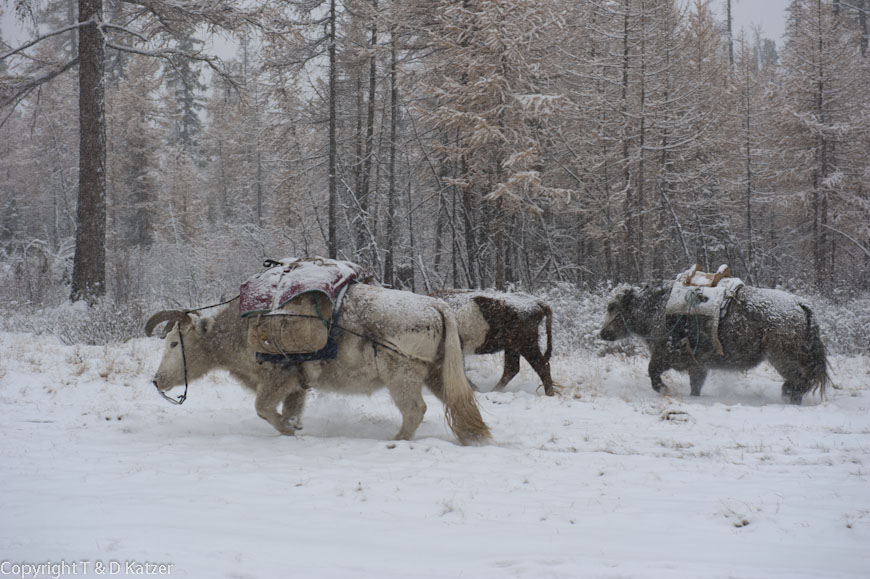
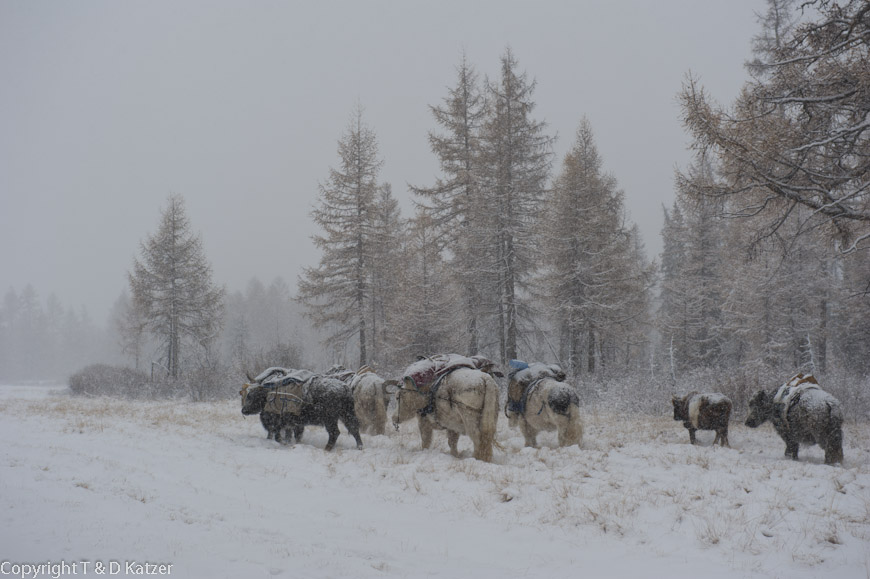

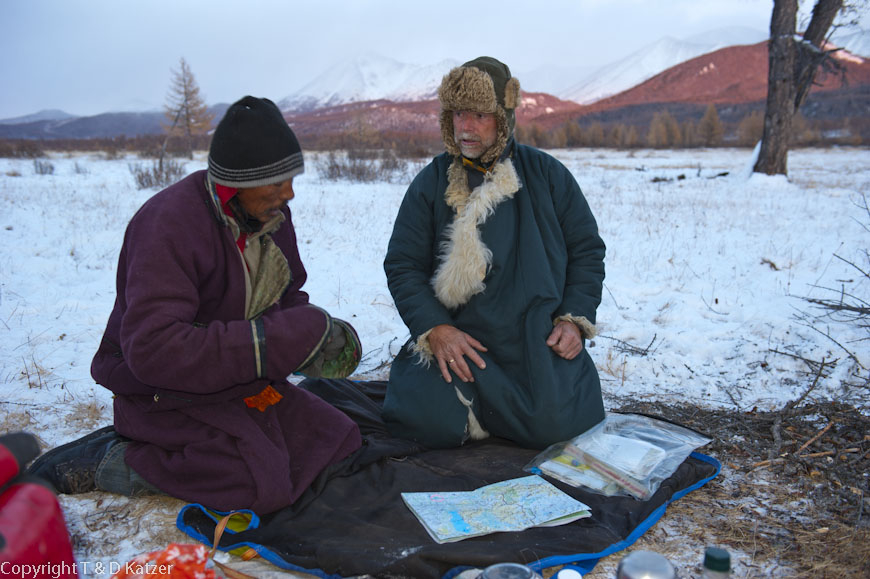
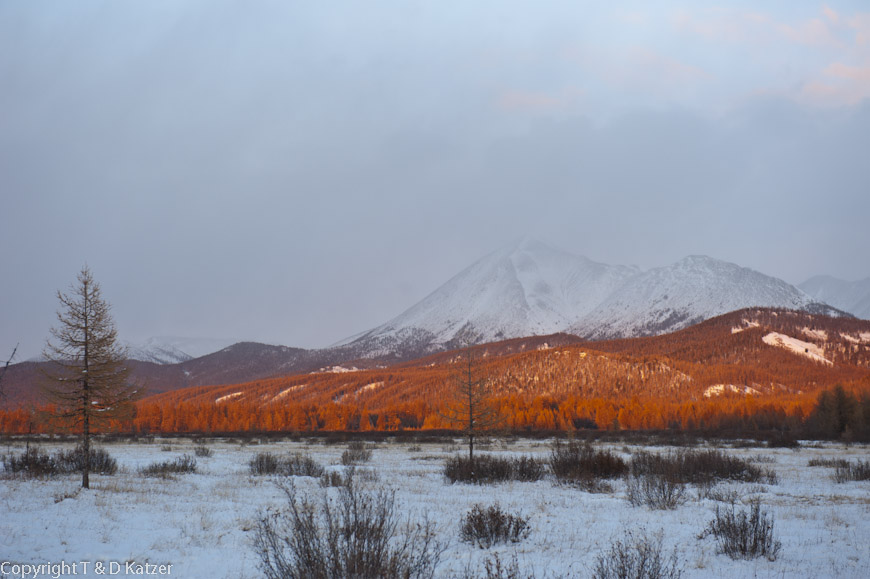
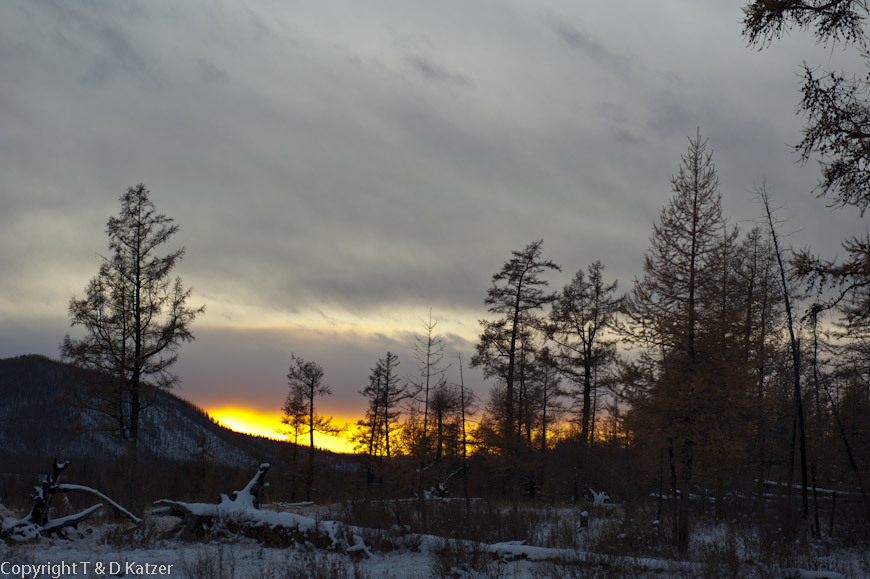
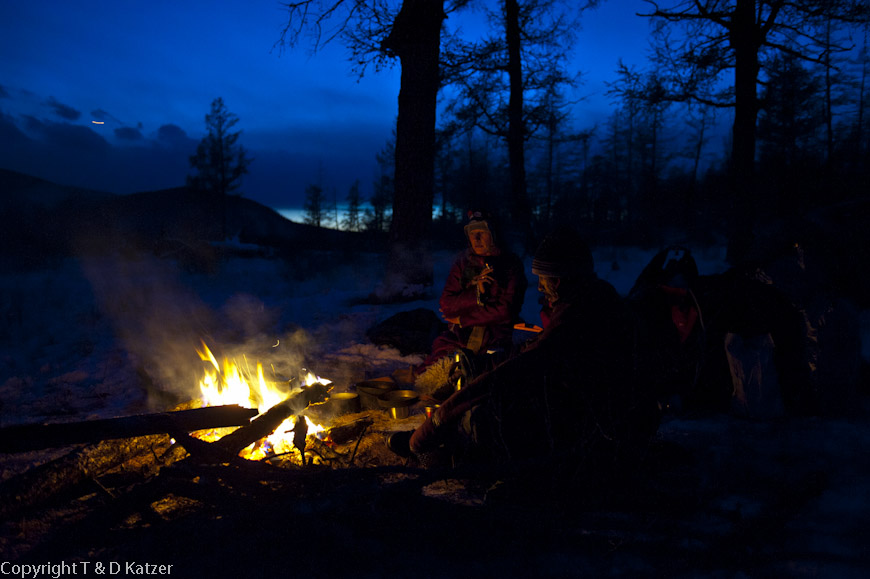
No matter how hard it is for me, I try to do my back exercises every morning before I get up. Of course, I’m not a gymnastics freak who has to exercise my body even during an expedition. No, the background is of a different nature. Because of an old intervertebral disc operation, I always have to do something to strengthen my back muscles. This keeps my back flexible and strong. Reason enough to fidget around in the tent even under these conditions. Meanwhile, Tanja gets dressed and leaves our den. They light a fire and boil some water while Bilgee looks after the horses. For me, this is the time to pack up everything we have in the tent as usual. Still in the tent, I push our sleeping bag outside to have more space in the small awning. I pack the clothes into a messenger bag, clear out the laptop and camera bags and drag the heavy car battery into the vestibule. Then I scrape several handfuls of ice off the floor with my gloves so that we don’t have to sleep in an ice castle at the start of the evening. After the tent is finally empty, I crawl outside on all fours. Living in a tent and yurt for the last few months and the associated crawling around has caused a thick callus to form on my knees. It soon looks like I’ll be able to walk through the taiga on my knees.
“Denis, Bilgee breakfast is ready!” Tanja asks us to come to the campfire. Due to the persistent snowfall overnight, the landscape around us is white and the tents are covered with a layer of snow several centimeters thick. Bilgee has tied a makeshift broom and uses it to sweep the paths to the tents. “He has a suitable idea for everything,” laughs Tanja. Bilgee sees her glare, clamps the broom between his legs and pretends he can fly away on it. “Ha,ha,ha”, we roll around laughing and hold our stomachs.
Before I eat anything, I warm up the batteries of our film camera by the fire. Only then is it possible to capture a few scenes. “What a bummer!” I curse out loud as my eyes fall on the open sleeping bag. “Everything full of snow. Sleeping bags, sleeping mats, everything. How am I supposed to get it out again?” I grumble, annoyed that I hadn’t already closed the bag in the tent. As nothing can get wet at minus 10 °C, I leave the mess for now and sit down by the fire. The increasingly heavy snowfall becomes more and more unpleasant. “Well, that’s going to be fun,” I say, as we can’t leave anything lying around without running the risk of losing the items we’ve put down. Within a few minutes, every utensil lying on the ground is hidden under the snowflakes.
Bilgee looks up at the sky and furrows his brow. After thinking about it for a while, he says, “It doesn’t look good. We’re in the middle of the clouds. The path is covered in snow and we have no orientation because of the poor visibility.” “We can find our way with the GPS,” I explain to Bilgee, who seems rather suspicious of my navigation computer. “Well, we can stay on course, but it’s almost impossible to find fords across the rivers ahead in this weather. That is risky. You already saw yesterday how dangerous it is to get our animals safely to the other bank. In heavy snowstorms like today, it’s difficult to find a safe passage,” he explains in a friendly and detailed manner. “Hm, you mean we should spend the day here at the camp and wait and see how the weather develops?” I ask. “Tijmee”, (yes) he replies. “Do we still have enough food? Can we afford this rest day?” I ask Tanja. “No problem at all. You told me from the start to pack at least three weeks’ worth of freeze-dried food. So we still have enough of that. Well, we don’t have any more bread, but we can manage without it,” is Tanja’s reassuring reply, who is in charge of all the logistics during our expedition trips. “Hm, all right then. Safety first. Let’s have a really lazy day and get some rest,” I decide, even though I would love to get to the safety of the nest as early as possible.
“Denis! Come over here!” I hear Bilgee shout. About a hundred meters away, I make out his waving figure through the thick snow. “Take the camera with you!” I hear and rush to my camera bag lying in the snow, shoulder it and hurry in his direction as fast as I can on the uneven ground. “Hurry up! There, you see the yaks? Those are Darkhaden. They’re moving to a new camp with all their belongings,” I understand his explanation. When I reach Bilgee’s location, I catch sight of the strong, panting highland cattle. They are loaded with heavy sacks and bundles. The sight of them takes me back to a time long gone. I look after the graceful animals, driven only by a shepherd, who are quickly swallowed up by the gloom of the day and the thick driving snow.
I trudge heavily back to camp and set about getting the tent ready for the night. First I stretch my Solapanel over it to store a little energy in the car battery when the sun is hopefully shining. It takes me an hour to remove the snow from our sleeping gear and get our domicile ready again. “You’ve decorated our house beautifully again. Thank you so much,” says Tanja, knocking the snow off her hat, jacket and trousers before slipping into our secure castle. While the thermometer outside reads minus 10 °C, we have a cozy 2 °C inside. “It’s crazy what warmth the air we breathe and our bodies give off,” I say, retreating into my sleeping bag. We actually use the day to doze off. It’s good not to have to do anything. Simply stretch out all fours and rest exclusively and alone. In the late afternoon, I grab our mending kit and sew a few torn hems on my Deel. Then I give the sewing kit to Tanja, who also mends her deel.
Before I go outside again, I work on my navigation. On the way to our destination, I place a coordinate point on the map every few kilometers, which I also transfer to the GPS. This enables me to navigate from coordinate grid to coordinate grid. Even if the weather is bad tomorrow, I will get us to our destination safely and without detours. The only challenges remain river crossings, upcoming lakes, of which I have discovered dozens on the map, and possible mountain ranges that we also have to avoid.
The weather is better in the afternoon. The snowfall has stopped, which gives us hope that we can expect good travel weather tomorrow. I’ll get some wood. There are enough of them in the taiga. Then I light a warming fire. When Bilgee and Tanja come out of the fabric houses, they are delighted with the hot tea. Bilgee uses the time available to us to cook his stew. “Mah (meat) is good. It keeps us warm,” he says with a grin, putting the meat, beaten with an axe, into the boiling water. As we hardly have any dried meat left, Tanja adds our only tin of meat to the pot. “There, that will certainly fill us up,” she says.
In the early evening, the sun bids farewell with a burning streak in the sky. Their rays bathe the larch forests in glowing red light. The fiery-looking taiga is extinguished by the bright white blanket of snow surrounding it. A mountain stretches out of the inferno, its peaks shrouded in a light mist, into the clearing sky. We sit there in amazement and watch the natural spectacle. This rare light only glows for a few minutes and then disappears as quickly as it came. I kneel by the fire with Bilgee and study my navigation charts. “If we bypass Renchinlkhumbe, we’ll be in Tsagaan Nuur in two days at the latest,” says Bilgee. As I wanted to buy groceries in the small town, I had planned the detour but the temptation to take a shortcut is great. “Can we manage without supplies?” I ask my head of logistics. “As I said, we don’t need anything except bread. And I think we can manage without bread for a few days, don’t you?” “Sure,” Bilgee and I nod. “However, shortcuts are not always faster. Sometimes the route is more difficult and you need more time than on the supposedly longer route,” I point out. Bilgee laughs. “We don’t need any longer. We’ll ride cross-country. That will save us a day’s travel,” he assures me, which is why I agree to leave Renchinlkhumbe to the left tomorrow and take a shortcut across the countryside.
Spooning up our stew, we sit by the fire at around minus 19 °C. “The snow has stopped falling and it’s clearing up,” says Bilgee, stretching his face up to the sky. “It could be a cold night,” I say, buttoning up my deel. “Hm, yes, it’s going to be a cold night,” confirms our horseman. “Will our supplies, which Saraa is sending to Tsagaan Nuur by four-wheel drive bus, get over the passes in time with the snow that has fallen?” “What do you mean?” I want to know. “Well, I hope we get everything in time when we get to Tsagaan Nuur,” Tanja ponders. “Maybe it will already be there when we reach Ayush’s hut? I could imagine that,” I reply. “I’d be more interested to know if our horseman Tulgaa, who is employed in Mörön, will be able to bring our horses back from Tsagaan Nuur to Mörön in this bitter cold,” I ponder. “I’m sure he’ll manage,” Bilgee reassures us. “Well, let’s see. It remains exciting,” I reply, standing up to retreat into the tent.
There are only five
During my shift from midnight to 2:30 a.m., I feel as if the tip of my nose is simply freezing off. I slip deep into my sleeping bag and, as so often, pull the sleeping bag hood up to the size of my fist. The band, which is used to close the down cover between the neck and shoulder so that no icy outside air flows from the head area to the body, is now pulled to the stop. Trapped and constricted in my thick sleeping bag, I try to breathe myself warm. However, it doesn’t take long before I get the oppressive feeling of lack of air. I can hold out for a while until I get the jitters and tear open the shoulder strap and the hood. I am immediately struck by a horrible, inhuman cold. I use this moment to listen outside. Is there a strange, unusual noise? Is a horse thief or even wolves sneaking around our camp? Nothing to hear. The brief moment was enough to make my face hurt, especially the tip of my nose. “Oh, I hope we don’t freeze our noses off,” I pray quietly. My feet feel like icicles. Once again, I gave my stupid laptop far too much heat from my hot water bottle to bring it up to working temperature, as I do every day on this leg of the journey. “Man oh man. This travelogue is unimaginably energy-consuming”, I think and wonder who will last longer. The laptop or me? One of them will break in. I am quite sure of that.
“Oh my feet,” I moan and feel the brilliant cold radiating from the permafrost floor through the tent groundsheet beneath us, the horse blanket spread out on top, the sleeping mat on top and the sheepskin blanket spread out on top into the expedition sleeping bag. As I’ve never been as cold as I am today, it must be colder than usual. Much colder. It’s 1:00 a.m. when I urgently need to pee. “No 10 horses are going to get me out,” I think. At 1:30 a.m. I give in to my urine pressure. “This fucking cold,” I curse, sit up, slip out of my down jacket and am immediately grabbed by icy, evil fingers. “Huaaaa, huaaaa it’s cold!” I open the zipper of the tent entrance, slip into my winter shoes and unzip the vestibule. There is something abnormal about the icy breath that hits me now. Something I’ve never experienced like this before. Dressed only in my sleeping clothes, I step out into the snow. I quickly run to the side of the tent where our thermometer is hanging. “Minus 30 °C! Wow! No wonder! Oh man, it’s cold,” I shiver more than I say. I pee in the snow just a meter away from the tent. As soon as the stream hits the ground, it freezes solid again. As usual, I lift my head to the side and count the horses. “One, two, three, four, five.” I’m just about to storm back into the safety of the tent when I pause for a moment. “Five?” I count again. “One, two, three, four, five. That’s it,” I say to myself and turn towards the entrance. “Five?!!! Why five? We have six horses. Now barely able to think because of the cold, I count our mounts again. “One, two, three, four, five. Oh my God. Where’s the sixth? Where’s the sixth horse?” I shine my headlamp on each horse. Sar, Naraa, Sharga, Od, Bor. “Who’s missing?” I ask myself, wondering why my brain doesn’t seem to be working properly in these temperatures. “Ah Tenger. Tenger is missing. Surely it can’t be that a thief has chosen the coldest night of my life to steal a horse on my damn shift?” I tremble. “Tanja! Tanjaaa!!!” “Yes! What’s going on?” she replies from the tent. “Tenger is gone. I don’t know where. He’s disappeared!” I shout desperately because of the cold and the crazy situation. “For God’s sake, put something warm on!” Tanja urges me as I run through the horses one by one in my pyjamas to discover that Tenger’s rope has been torn off. “Not a thief,” I say, somewhat relieved at first. The rope is broken and he’s run off!” I shout. “Put something on Denis! You’ll catch your death out there!” Tanja shouts demandingly and hands me my Deel outside. I immediately slip into the sheepskin coat, which instantly warms my frozen body. Then I pull on my fur hat and slip my hands into the thick gloves that Tanja also hands me. “Phew, that feels better,” I blow out and feel like I’ve been saved for the time being.
“Bilgee! Bilgeeee!”, I wake up our horse man. “Tijmee (Yes) What’s wrong?” he replies. “Tenger is gone.” “Juu!?” (“What!?”) “Tenger is gone,” I repeat. It doesn’t take long for Bilgee to come out into the cold darkness, dressed in his winter deli and thick felt boots. As soon as we reach the place where Bilgee had tied Tenger up, his headlamp fails. I immediately fetch spare batteries from the tent, which don’t promise to work for long because of the temperatures. We follow Tengers tracks in the light of our flashlights. The experienced hunter Bilgee can distinguish Tenger’s prints from the other tracks the horses made through the snow here last night. I’m amazed, because they all look the same to me. It takes me some time to figure out what the distinguishing feature of Tenger’s tracks is. He drags a short piece of rope behind him, the end of which leaves a small elongated strip in the snow in some places. We now trudge east past the tent. “Do you need help Denis?” asks Tanja. “No. Stay down,” I reply, as a third person can’t do any more than the two of us at the moment. “Don’t get lost!” Tanja warns us. I pause for a moment and think about the consequences of actually getting lost in these temperatures. No question, they would be deadly. “Not possible. Our tracks will always show us the way to the camp,” I reply. But what if the batteries in our headlamps fail? I think about it further. “Okay, please give me the GPS,” I say to Tanja, trudging back to the tent.
With the GPS in my pocket, I follow Bilgee and now Tenger’s trail to the east. Then it gets lost. Have we tracked down the right one? Bilgee talks quietly to himself incessantly. He seems calm and confident. But what if Tenger ran to the river to get a drink? What if he has joined one of the herds of horses living here? My thoughts are racing. Can we manage without Tenger? We would have to distribute the equipment to the other horses and Bilgee would have to ride Bor or Sharga. That might be feasible, I think as we walk into the dense forest, more prints on our heels. It is almost a little scary to trudge through the taiga in the dark at minus 30 °C, where, according to the shepherds, there are many wolves that often kill horses or cattle. I am aware that wolves have only attacked humans in history and only in very rare cases. Probably only when a person got lost in the woods and was injured. But Bilgee and I aren’t exactly defensive at the moment. “Oh man. That shouldn’t have happened just before the stage finish,” I curse quietly. “Juu?” (“What?”) asks Bilgee. “Oh, nothing,” I reply, trudging along with him through the crunching snow. Our trail into the forest also ends in nothing. Apparently it wasn’t Tenger’s tracks. We turn back and when we reach the clearing again we are confused by the countless hoofprints in the snow. Of course, the shepherd who passed through here with his herd of horses in the afternoon caused the chaos of tracks. Oh, how are we supposed to find our horse? Bilgee is now running west. I’m beginning to understand his tactics. He walks the outermost boundary of our camp and follows every footprint that has left this circle. Sophisticated. I once searched for our camels in Australia in the same way, as they had escaped in an unobserved moment on the way to water. Back then, the situation was even more dangerous than it is now, because we had lost all our pack animals in the middle of the merciless outback at plus 68 °C in the sun and plus 48 °C in the shade. We wouldn’t have got out of there alive without them. Now only one of six horses has gone missing. But at minus 30 °C. However. It is tiresome and useless to compare situations.
“Juu tsch ügüj”, (“Nothing”) means Bilgee. Now there is only one direction left. My hands, feet and face freeze as I crunch through the snow. “Maybe we can recognize his eyes in the beam of the headlamps?” I suggest changing our search tactics. “Hm,” Bilgee replies, continuing to follow a trail that shows no elongated strip of string. While Bilgee trudges through the snow with his head down in concentration, I let the strong beam of my flashlight glide across the clearing and into the forest. Always hoping to meet two reflective eyes. I’ve almost given up hope of ever finding our Tenger again when I suddenly see something flash. I stop abruptly and let the glistening beam of the flashlight glide over the reflection again and again. Without a doubt, there are eyes. Because they are only 200 meters away from our own horses, it could indeed be Tenger. “Bilgee!” I call out quietly. “Look over there,” I say, holding the beam of light on the slightly moving pair of eyes. “Sain”, (“Good”) he says with a grin. We quickly trudge in the direction of the glowing dots. It takes a load off my mind. There he is, standing peacefully in the snow, scratching for food under a tree. Exactly where we turned around 20 minutes ago. Unfortunately, it does not have a guide rope hanging from its neck as expected. His rope broke right at the carabiner.
As Tenger is the shyest of all our four-legged companions, it takes a lot of experience to catch him. Bilgee quietly whistles a little song and pretends it’s the most normal situation in the world. He bends down, making the horse believe that he is working on his hobbles, which are also open. Tenger is therefore completely free. He snorts nervously and jumps back a step. Bilgee follows him, still whistling. It’s crazy how you can whistle a cheerful tune at 2:30 in the morning in these temperatures. As Tenger refuses to be caught and keeps dodging, we put him in a pincer. On one side there are impenetrable taiga bushes and on the front side we approach in a scissor-like manner as if in slow motion. “Brrrrrrr,” snorts the nervous horse. Bilgee kneels down in the snow, gets hold of the open hobble and closes it. Slowly feeling his way up his neck, he reaches for his halter. ‘Good boy,’ I whisper with relief. Then we tie him back to his horse colleagues. “Tawtaj nojrsooroj”, (“Good night”) I say to Bilgee. “Tawtaj nojrsooroj,” he replies kindly. “Bilgee?” “Tijmee?” “Tschin setgeleesee bajrlalaa (Thank you very much). You did a fantastic job,” I say and squeeze his hand to show my gratitude.
It’s just before 3:00 a.m. and still minus 30°C when I slip back into our tent. I quickly crawled into my sleeping bag. Although it’s heavenly warm in here compared to outside, my feet stay cold until the morning. I review my thoughts and come to the conclusion that this night is the coldest so far and probably one of the most unpleasant in my life.
We look forward to your comments!

